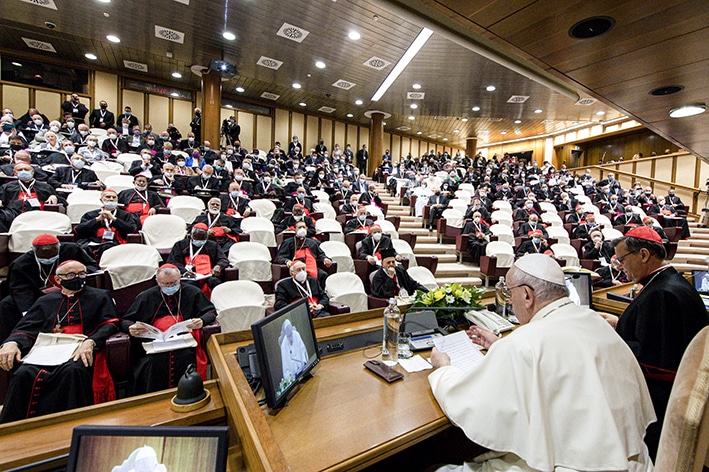
Speaking with friends, none of us is clear what synodality actually means!
To answer your question I will draw mainly on the International Theological Commission’s document “Synodality in the life and mission of the Church”, issued with the approval of Pope Francis on 2 March 2018.
The word “synod”, or synodos in Greek, is an ancient word in the tradition of the church. It is composed of the preposition syn, meaning “with”, and the noun odos, or “path”. It thus means the path along which the People of God walk together. St John Chrysostom writes that the Church is a “name standing for ‘walking together’” (Exp. In Psalm., 149, 1). In the early second century, St Ignatius of Antioch applied the term to the various local Churches, which are synodoi, or companions on the journey of the one universal church (Ad Ephesios IX, 2).
From the beginning of the church, the word “synod” was also applied to church gatherings at various levels, both local and universal. Thus, one could speak of the Synod of Toledo, or the Synod of Nicaea. Here, as the document says, the word “synod” means the same as “council.” Since the Second Vatican Council, the word “synod” has been applied especially to the periodic gatherings of a selection of bishops from all over the world to meet with the pope and advise him on certain issues. The Synod of Bishops which is to meet in October is one of these.
The word “synodality” is what the document calls a “neologism”, or newly-coined word. It is derived from the adjective “synodal” and has come to mean something like “walking together.” It is considered to be a constitutive dimension of the church. While the Second Vatican Council did not use the word, the concept of synodality was at the heart of the council’s teaching, coming to mean much the same as communion, or union with God the Blessed Trinity and union with others in the church.
Synodality is also at the heart of the ecumenical commitment of the church, because it represents an invitation to walk together on the path towards full communion with people of other faiths and because, when understood correctly, it offers a way of understanding the church where legitimate differences find room in an exchange of gifts in the light of truth.
By way of summary, the document says that in the communion of the people of God with the Blessed Trinity “can be found the source, the form and the scope of synodality, inasmuch as it expresses the specific modus vivendi et operandi of the People of God in the responsible and ordered participation of all its members in discerning and putting into practice ways of fulfilling its mission.” (n. 43). In a nutshell, it means everyone working together toward a common goal.
The church journeys together with Christ towards the end of time and towards the ends of the earth, in the union of the local churches with each other and with the church of Rome. The church’s synodality is lived out especially in the service of her evangelising mission, with all the baptised involved as missionary disciples. This missionary aspect of synodality is emphasised numerous times in the document.
Consulting and listening to the lay faithful, who make up a great majority of the church, before the hierarchy makes decisions, is an essential aspect of the synodal process. “Working things out is a synodal task; decision is a ministerial responsibility” (n. 69). This process should take place at all levels of the church: local, regional and universal. And it should always be faithful to the deposit of faith received from Christ and respectful of the authority of pastors.
Thus, while pastors should listen to others before making decisions, synodality is not a democratic free-for-all where everyone has an equal say in decision-making. Pope Francis said as much in his homily on Pentecost Sunday 2023: “And the Synod now taking place is—and should be—a journey in accordance with the Spirit, not a Parliament for demanding rights and claiming needs in accordance with the agenda of the world, nor an occasion for following wherever the wind is blowing, but the opportunity to be docile to the breath of the Spirit.”
